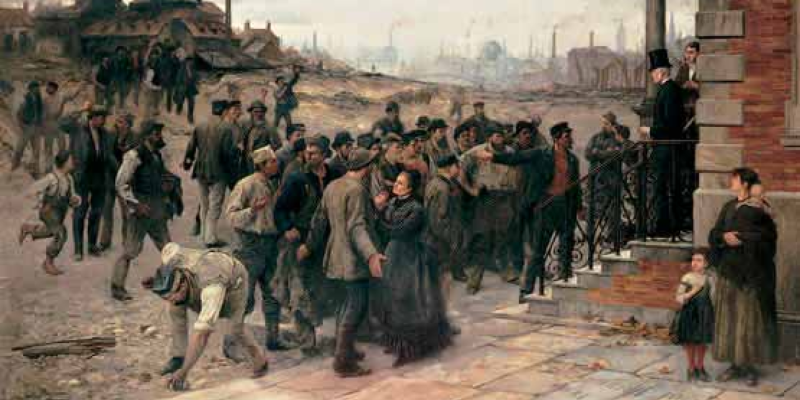We explain what anarchism is and what its principles and currents are. What's more. its general characteristics, methods, and criticisms.
What is Anarchism?
Anarchism is a philosophical and social movement whose main objective is the abolition of the State (of all types of government ), as well as of all forms of authority, hierarchy, or social control that can be imposed on individuals, considering them harmful, unnatural, and ultimately unnecessary.
Anarchism, in that sense, focuses its interests on the individual and society, with the purpose of promoting social change that leads to a society without masters or sovereigns.Under the anarchist banner, numerous political and social movements have historically been organized, of different tendencies and with different procedures or methodologies, from the most radical to the most sedate. There is, in that sense, no explicit agreement as to what an anarchist is and what is not.
Origins of the term Anarchism
The terms "anarchism" and "anarchist" with the current connotation have their origin in the framework of the French Revolution of 1789. They were used as a derogatory term, to refer to the times of terror and revolutionary chaos that took place in some of its most convulsive stages, so that both Robespierre and the Enragés were branded, anarchists.However, the word as such comes from the Greek, and is composed of the words an - ("without") and arkhé ("power or mandate"), since its initial uses were to refer to the stages of a power vacuum in the Republic.
First anarchist movements
 Anarchism as a movement comes almost directly from the labor movement that emerged in the early nineteenth century, struggling to improve the conditions of frank oppression in which the proletariat found itself at the beginning of industrialized capitalism.
Anarchism as a movement comes almost directly from the labor movement that emerged in the early nineteenth century, struggling to improve the conditions of frank oppression in which the proletariat found itself at the beginning of industrialized capitalism.In that struggle to vindicate the lower classes and advocate for an egalitarian society, libertarian communism and utopian socialism, the most extreme aspects of Marxism, played a fundamental role, but they formed an authoritarian left from which anarchism would come to separate itself, at enmity with the idea of the dictatorship of the proletariat or of any kind of authority.
Principles of anarchism
Despite its diversity, anarchism generally holds true to the following fundamental principles:
- Freedom. Anarchism rejects all forms of social hierarchy, oppression, or repression, considering them contrary to human nature, and advocates the abolition of all forms of government, state, or company, preferring a society self-regulated by human nature, which it considers inherently kind and compassionate.
- Equality. Social classes and hierarchical distinctions are the enemies of anarchism, which pursues a society of full equality, in which no human being exploits and corrupts another through power. Private property, especially, is seen as an affront by anarchism.
- Solidarity. Anarchism considers the human being as social and cooperative by nature, so it advocates a society in which the laws of cooperation and not of competitiveness direct human interests. This impulse must be the one that orders societies, and not a direction external to themselves.
Main anarchist currents
 The main known currents of anarchism are:
The main known currents of anarchism are:
- Individualist anarchism. This is the name given to a set of anarchist philosophies and literary manifestations, grouped around the principle of the elevation of the individual above the moral, social and religious constructs that society imposes on him, but also the rejection of the revolution and the construction of a society of transitory commitments and free from all control.
- Mutualism. Fruit of the ideas of the French Pierre-Joseph Proudhon, this movement imagines a society in which each individual possesses the means of production necessary to satisfy their demands and needs, complementing it with a dynamic of exchange in which each person would seek something equivalent to what offers.
- Communist anarchism. Also known as libertarian communism or anarcho-communism, they derive their ideas from the proposals of Mikhail Bakunín, a Russian revolutionary aristocrat, but reject from them the idea of the authoritarian state. Communist anarchism supports a free voluntary association without the state, without class distinctions, and through the socialization of all forms of goods, services, and means of production.
- Anarcho-syndicalism. This movement complements the labor union struggle with the ideological contents of anarchism, promoting the conquest of the means of production by the workers to abolish the wage system and social classes, and then reorder society based on federalism and direct democracy.
- Anarchism without adjectives. In late 19th century Europe ( especially Spain and Italy ), anarcho-communists and collectivists managed to overcome their differences and found anarchist organizations that did not distinguish between these ideological nuances.
New currents of anarchism
 At present, anarchism has assumed various contemporary forms, especially by allying itself with more recent trends and concerns in our societies, such as:
At present, anarchism has assumed various contemporary forms, especially by allying itself with more recent trends and concerns in our societies, such as:
- Environmental anarchism. Called eco-anarchism or green anarchism, it fights against industrial society and its ways of life, proposing an integration with the environment that is sustainable, simple, and self-sufficient.
- Anarchist feminism. This movement for the legitimization of women's rights combined its principles with those of anarchism to produce an ideology whose central precept is that the vindication of the female role in history can only occur after the abolition of the State, together with the traditional conceptions of sexuality, family and gender.
- Anarcho-capitalism. Part of the international “New Right”, this anarchist movement on the other side of the ideological spectrum maintains that real capitalism produces a free society, without exploited or exploiters, but that this is not possible due to the State that perverts relations and creates monopolies.
Main thinkers of anarchism
The fundamental names of anarchist philosophy are many since the movement is diverse and complex, but the names of William Godwin, Pierre-Joseph Proudhon, Max Stirner, Anselme Bellegarrigue, nor those of Mikhail Bakunin, Lysander Spooner cannot be omitted. , Émile Armand, Piotr Kropotkin and Elisée Reclus.
Difference between anarchism and communism
The fundamental difference between communism and anarchism is that the latter plans a society of a single social class: the proletarian, through a strong state that controls the economy and socializes the means of production.The latter is usually valued by anarchists, but they see the State as their greatest enemy and would never agree with the idea of a dictatorship of a single social class since their thinking is libertarian.
Anarchist Fighting Methods
 Anarchists became famous for their massive calls for strikes, demonstrations, and for their printing of pamphlets and magazines calling for insurrection. However, more extreme slopes are incurred in violent actions: planting bombs, fomenting civil uprising, and even forming small militias in the framework of larger-scale military or social conflicts.
Anarchists became famous for their massive calls for strikes, demonstrations, and for their printing of pamphlets and magazines calling for insurrection. However, more extreme slopes are incurred in violent actions: planting bombs, fomenting civil uprising, and even forming small militias in the framework of larger-scale military or social conflicts.
Criticisms of anarchism
Anarchism is accused of fomenting chaos and advocating a social utopia that would dismantle historically constructed structures, with no guarantee that what remains is better. On the other hand, the socialist left accuses them of individualists who do not watch over the common progress of society as a whole.
Art and anarchism
Anarchism had a marked influence on art, especially during the 20th century, due to its libertarian thinking. The works of writers like Tolstoi, Camus, George Orwell, Thoreau, or even cartoonists like Alan Moore, are good examples of this. Also the cinema of Jean Vigo, Truffaut, Fincher, and numerous works of pictorial and theatrical art.The above content published at Collaborative Research Group is for informational and educational purposes only and has been developed by referring to reliable sources and recommendations from technology experts. We do not have any contact with official entities nor do we intend to replace the information that they emit.
She has pursued her studies in The United States, where she has graduated in Business and Economics and is currently finishing her Master studies in International Economics and Finance. Miss. Amputee is fluent in three languages: English, Spanish and Russian and has elementary knowledge of French and Italian. She love exploring how Collaborative Research Group can become the best tool to achieve the (necessary) educational change. .
Leave a reply
Your email address will not be published. Required fields are marked *Recent post

Sport: What Is It, Types, Risks, Features, Characteristics and Examples

Dogs: Emergence, Features, Characteristics, Feeding and Breeds

Story: Definition, Elements, Structure, Features and Characteristics

